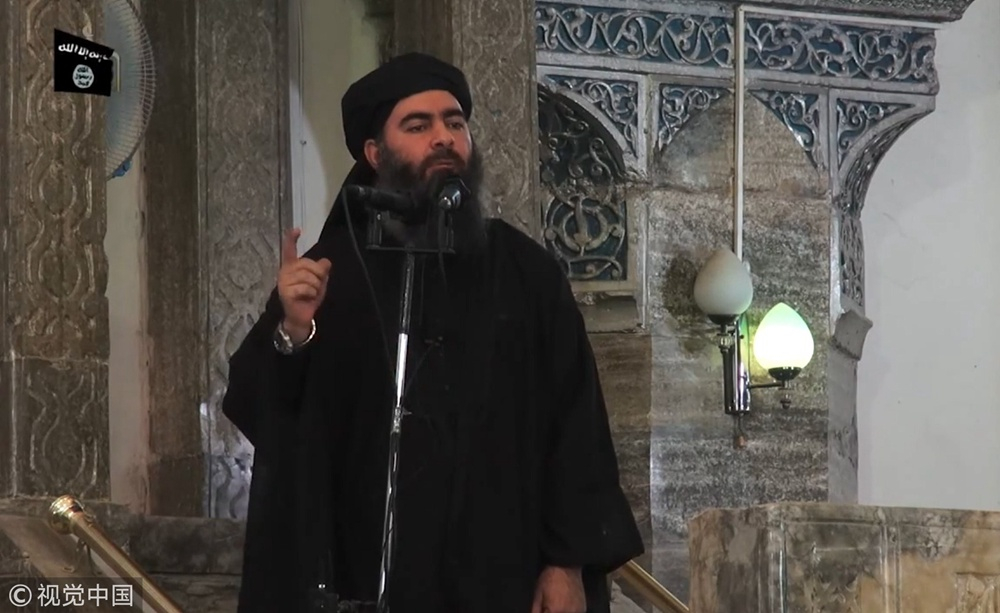
ISIL Chief Abu Bakr al-Baghdadi addresses Muslim worshipers at a mosque in the Iraqi city of Mosul in this still from a video released on July 5, 2014. (Photo: VCG)
BAGHDAD, Oct. 27 (Xinhua) -- The death of Abu Bakr al-Baghdadi, top leader of the Islamic State (IS), marked a painful blow to the extremist group but would need more action to end its threat to the global security.
Early on Saturday, eight U.S. helicopters and warplanes carried out an airstrike targeting the hideout of al-Baghdadi in Syria's northwestern province of Idlib, according to a statement by the Syrian Observatory for Human Rights.
The attack resulted in the killing of nine people, including al-Baghdadi himself, his wife and a number of children, the London-based watchdog said.
On Sunday, U.S. President Donald Trump officially announced that al-Baghdadi was killed in a U.S. military operation in northwestern Syria.
Najib Khalaf, a political analyst and teacher of politics in al-Nahrain University, told Xinhua that he believes the death of al-Baghdadi, despite impact on the IS, would be more of a symbolic and short-lived tactical victory in the fight against the group.
"The terrorist organization is not built around one man, but rather it has been designed as a global organization. It is simply not enough, as al-Baghdadi's role has been symbolic more than a military strategist," Khalaf said.
The most important thing to do after al-Baghdadi's death is to continue dismantling the organization as a whole, including its affiliates in Libya, Egypt, Nigeria and Afghanistan, he noted.
"The elimination of al-Baghdadi will not completely reduce the IS threat, as both the Salafi jihadist ideology and the splintered remains of its organization will remain strong," the Iraqi analyst warned.
However, al-Baghdadi's death will push the IS into a new stage of fragmentation and weakness, as there will be internal dispute over who should be the successor, Khalaf said.
Nadhum al-Jubouri, another Iraqi political analyst, agreed that the killing of a leading figure in the IS doesn't mean the end of the extremist ideology.
"It would only mean that a new leadership will appear and new terrorist strategies will appear," al-Jubouri said.
The battle against the IS will continue, as the militant group will focus on "qualitative" operations to prove the IS is not terminated by the death of its leader, he concluded.
Hisham al-Hashimi, a political expert on terrorist groups, told Xinhua that the death of al-Baghdadi will be followed by a period of calm in terms of the terrorist operations.
"This is exactly what happened after the death of his predecessor Abu Omer al-Baghdadi who was killed in April 2010 in Iraq. The terrorist group needed four months to reactivate its operations," al-Hashimi said.
Al-Baghdadi, 48, whose real name is Ibrahim Awad al-Badri, announced the establishment of a caliphate, or the so-called Islamic State, in June 2014.
His extremist militant group once captured large swathes of land in western and northern Iraq as well as parts of neighboring Syria, but was later defeated in both countries.
In 2016, the U.S. State of Department offered a reward of up to 25 million U.S. dollars for information leading to his capture or death.


